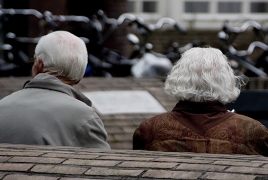Researchers reveal natural limit of human lifespan October 6, 2016 - 14:01 AMT PanARMENIAN.Net - Humans are unlikely to ever blow out more than 125 candles on their birthday cake, according to research that suggests that our lifespan has already hit its natural limit, The Guardian reports. The oldest human who ever lived, according to official records, was 122-year-old Frenchwoman Jeanne Louise Calment, who died in 1997. “The chances are very high that we [have] really reached our maximum allotted lifespan for the first time,” said Jan Vijg, co-author of the research from the Albert Einstein College of Medicine in New York. Figures such as Aubrey de Grey, chief scientific officer at the Strategies for Engineered Negligible Senescence (Sens) Research Foundation, have previously claimed that the first person to reach 1,000 years old is likely to be alive today. But the new study suggests that is highly unlikely. The upshot, says Vijg, is that people should focus on enjoying life and staying healthy for as long as possible. “That’s where we have to invest our money,” he said, according to The Guardian. The notion of extending the human lifespan has captured imaginations for millennia. Among scientists, enthusiasm for the idea has grown in recent years with a host of Silicon Valley companies springing up to join academic institutions in attempting to chip away at issue of longevity - among them Google’s California Life Company, or Calico, as it is known – with big-buck prizes such as the Palo Alto Longevity Prize adding to the clamour. But the researchers, writing in the journal Nature, describe how analysis of records from a number of international databases suggests there is a limit to human lifespan, and that we have already hit it. Using data for 41 countries and territories from the Human Mortality Database, the team found that life expectancy at birth has increased over the last century. That, says Vijg, is down to a number of factors, including advances in childbirth and maternity care, clean water, the development of antibiotics and vaccines and other health measures. But while the proportion of people surviving to 70 and over has risen since 1900, the rate of improvements in survival differ greatly between levels of old age. Large gains are seen for ages 70 and up, but for ages 100 or more the rate of improvement drops rapidly. “[For] the oldest old people, we are still not very good at reducing their mortality rates,” said Vijg. Authorities said a total of 192 Azerbaijani troops were killed and 511 were wounded during Azerbaijan’s offensive. In 2023, the Azerbaijani government will increase the country’s defense budget by more than 1.1 billion manats ($650 million). The bill, published on Monday, is designed to "eliminate the shortcomings of an unreasonably broad interpretation of the key concept of "compatriot". The earthquake caused a temporary blackout, damaged many buildings and closed a number of rural roads. Partner news |